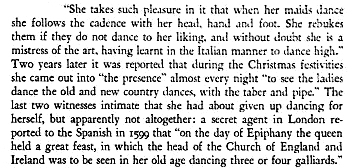England: history of the pipe and tabor
the 16th century dancing
“Three hundred years ago there was no country whose people were more addicted to dancing than the English. People's Palace Journal of January 11, 1888 |
|
1520 "..King Francis and Queen Katharine having finished their repast above, came into the hall, and dancing "All the other lords, barons, and courtiers ate in this place in like manner apart at their respective tables, and during An Account of the Conferences held by King Henry VIII. with the Emperor Charles V. and King Francis I. |
|
| “July 9, 1539, a performance of Antonio Landi's comedy, Il Commodo, was given. At the conclusion of the play was an aria accompanied by four sackbuts. This was followed by a dance, with bacchantes and satyrs, a four-part instrumental work performed by two cornetts, two crumhorns, a coiled trumpet (tromba torta), pipe and tabor rebec and harp.” the renaissance wind band and wind ensemble, 1983 |
|
1560 Aston Tirrold, Berkshire
Archdeaconry of Berkshire Act Book |
|
1570
Letter from Robert [Horne], Bishop of Winchester, Winchester, to William More, Loseley. The National Archives 6729/6/17 |
|
1577 criticism of dancing: “…It is for their recreation, forsooth, (say they) and then it is a worlde to see, nay, a hell to see, howe they will A TREATISE AGAINST DICING, DANCING, PLAYS, AND INTERLUDES, WITH OTHER IDLE PASTIMES. BY JOHN NORTHBROOKE, |
|
1579 Cambridgeshire, Diocese of Ely,
Bishop Richard Cox's Injunctions: |
|
| 1581 Aldworth,
Berkshire
“…they denie that there was anie pyping or dansing in the churche yearde at anie tyme but sayethe upon
a tyme when the parson was preaching there weare some strangers that had mistrelles there and made mearye but left playing when they weare commanded…” Archdeaconry of Berkshire Act Book |
|
| 1581 Leverington, Cambridgeshire, Diocesan Court Proceedings: “Willelmus Typpin (Alehousekeper) he suffred a piper to be at his house with uther cumpanye, dawnseinge uppon Candlemas daye 1580 at the after none in service time.” |
|
1586 ‘A discourse of English Poetrie’ 1586, by William Webbe page 59, reprint 1871 |
|
1586 Bleadon, Somerset, on July 8, Accusation in the 1593/4 Ex Officio Act Book of Butcombe against a fidler for tempting people away from church: |
|
1588 Oldham On the 14th, being Sunday, "there was, by certain of Oldham parishe, in tyme of divine service, gallowpinge The National Archives DDKE/acc. 7840 HMC/f.2 |
|
| 1590 Aldborough, Yorkshire North Riding, Detecta for the Visitation of Archbishop John Piers: ” henrie Robinson & wilfrid Ingland for behaving them selfes disorderlie in church in service time, in piping dauncing & playing Mr hudesley the vicar being then preaching” |
|
|
|
|
As she grew older, Queen Elizabeth I became more and more interested in 'English' dances, as opposed to those 1591 Queen Elizabeth visited Cowdray, where she watched Lord and Lady Montagu dancing with their tenants and Nichols, J. 'Progresses of Qneen Elizabeth. Vol. II. The Qneene's Entertainment at Cowdrey' p. 6 in 'THE DANCE and SOCIETY “On Thursday the lords and ladies dined at a table forty-eight yards long, and there was a country dance Highways and Byways in Sussex, by E V Lucas, 1904, p5 |
|
1591 Lancashire: Letter from EDMUND HOPWOOD to the ARCHBISHOP OF YORK The "enormoties" of the Sabboth, in Lancashire, which require suppression are these:- The National Archives DDKE/acc. 7840 HMC/f.112d |
|
1591-1593 Kent: " Henry Bassett of Goudhurst cited for coming to Brenchley on Sundays and piping and dancing" Ex officio act book DRb/Pa21, Kent History and Library Centre |
|
| 1597
" London is so full of unprofitable pipers and fiddlers, that
a man can no sooner enter a tavern, than two or three cast of In the thirty-ninth year of Elizabeth (1597), a law was
promulgated against these humble sons of the
Muses, by which ' Short Apologia of the Schoole of Abuse,' Gosson, page 277 |
|
| 1598 ' Love's Labour's Lost - Act 5' by William Shakespeare
“…Dull. I'll make one in a dance, or so; or I will play other Shakespeare quotes here |
|
| 1599
“In 1599 Elizabeth paid her last visit to Hampton Court, as determined as ever to be young and frivolous. From: an unpublished report of Lord Semple of Beltreis to the King of Scots, |
|
1600 Queen Elizabeth:  |
|
1602 On 19th September, the Earl of Worcester wrote to the Earl of Shrewsbury, reporting on Queen Elizabeth's quoted in ‘Framing a Ditty for Elizabeth: Thoughts on Music for the 1602 Summer Progress’ by Ross Duffin, 2020 |
|
| 1602 also the “letters between the Earls of Salisbury and Worcester, 1602, describe the dancing of country dances with the pipe and tabor in the palace of Nonesuch at Cheam.” 'Playford's English Dancing Master 1651' by margaret dean-smith f.s.a. 1957 |
|
folk customs |
|
1569 folk customs from Newport, Isle of Wight: “And assone as ye said commen people ar spedde competentlie with greene bowes they retorne home There was a separate May Day procession for the ladies: 1585 “In a diocesan letter of May 1585, Bishop Cooper of Winchester had forbidden May-games 1596 “an elaborate feast which took place in the forest in August, 1596…there weare ye Cheyfe youth from 'Newport Ligger Book' quoted in ‘THE WOOD EAVES’ by Jane Cowling |
|
1592 High Commission Order for the Suppression of Entertainments:
|
top of page